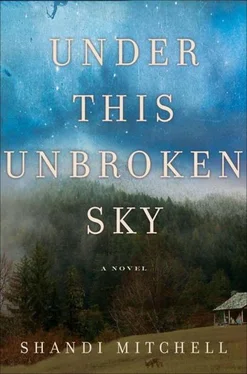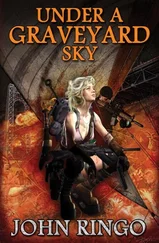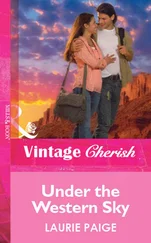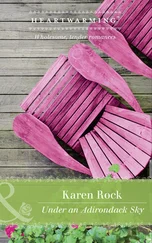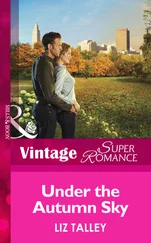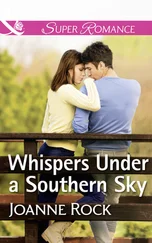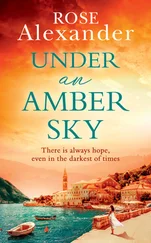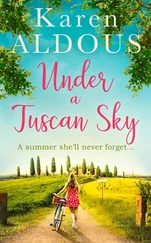They took the three horses and slipped away under the cover of dark—Teodor in the lead with Sofia, followed by Dania and Myron, and Maria bringing up the rear with Katya. They traveled only at night, following the bush, avoiding the villages and blocked roads. If the horses’ ears pricked west, Teodor went east before veering back. In daylight, they slept hidden under leaves and branches. They spoke only in whispers. She told the children it was a game to see how well they could hide. When they ran out of their few spoiled potatoes, they ate grass and berries. When one of the horses lay down, unable to go farther, Teodor whispered in its ear as he slit its throat and then they ate it.
When Maria wanted to stop, Teodor made them keep going. His belief never faltered. They would make it. He didn’t allow for any other option. With every step, Maria expected the bay of tracking dogs; with every shadow, someone to betray them; with every bend, soldiers waiting; and with each crack of a snapping twig, a volley of shots. But no one came. She had her miracle. But it wasn’t her conviction that had carried them; it was Theo’s. She would have lain down.
Five days later, they were safe in Halychyna, in Lviv. Teodor sold the horses for a few coins. Enough to pay for a forged exit document and third class rail to the port in Hamburg. They told everyone they met what was happening to their country. People shook their heads and looked away. Some offered them bread.
Teodor found the government people who wanted Ukrainians to come to their country. The Canadian representatives smiled, gave them food, and arranged their passage. One even spoke Ukrainian. The men wrote their names in logbooks and beside Teodor’s name wrote Farmer.
They didn’t want to talk about what was happening in Ukraïna either. They didn’t want to hear about Stalin and that there was no drought; that soldiers were cutting down fields and confiscating seed; that people were eating horses until there were no more horses; eating dogs until there were no more dogs; eating rats, because there were always plenty of rats. They didn’t want to hear that. They wanted to talk about Canada having the healthiest climate in the world and farms for everybody. They wanted to get them on the boat.
Maria was only to bring practical items but had managed to carry her wedding linen. She used it to bundle their other belongings: two pots and a pan, a few utensils, a goose-down quilt, her mother’s handwoven wool blanket, sewing supplies, tonics, medicine, seeds, two sets of clothes for each child, a hairbrush, six skeins of wool, and the family crucifix and bible, which she had retrieved from under the outhouse floorboards. The only other sentimental item she had smuggled in was a handkerchief filled with the rich, black earth of her homeland.
They were crammed into the lower deck of the ship with two hundred others. They pushed their way to a stack of crates beneath a hatch, which in the days to come would provide their only fresh air. They clung to their heap of possessions. The children—too weak, too overwhelmed—never wandered. She made them eat the foul-tasting stew ladled from the massive kettles into their dinner pails. She held the chamber pot for them to throw up in. She wiped their faces and sponged their bodies with her skirt. She held them up to the hatch until her arms went numb. She told them stories and sang lullabies, coaxing them to sleep, to forget.
When the ship arrived at the pier in Halifax, she had to open the handkerchief at customs. The officers laughed at her pile of dirt, but they let her pass. She carried it on the train across the country, two thousand miles. And when the tracks ended, she carried it on the wagon across the prairies and north into the bush. And when the wagon ran out of trail, she carried it on foot. Even when she had to leave behind clothes and a pot, she didn’t put down the handkerchief. When the children were hanging from her waist and wrapped around her neck, she held on to that bundle. And when they finally staggered over the last hill and came to their squat of land, buried in trees and rocks, she fell to her knees, kissed the ground, and mingled her precious soil with this new land.
That was at their old home. Their first home in Canada. It’s where they built their house, broke the land. Where Ivan was conceived on a still, warm April night. Teodor had led her to a patch where he had cleared the land of scrub and roots. This was where he would build their log cabin. He had marked its frame with logs. He took her hand and guided her through the stick drawing. Here’s the kitchen, here’s the children’s rooms, here’s the pantry, here’s the stove, here’s the windows—see, they look out over the fields. In what was to be their bedroom, he had laid out the wedding linen. Blue-white under the full moon. They made love there, immersed in stars. She had never been able to scrub the grass stains from the precious cloth. That was the last place her family had called home.
“Teodor, the water is ready,” Maria calls softly out the door.
The man who walks through the door is old. His body moves stiffly, his shoulders hunched over. His gait is almost a side-to-side shuffle. The feeble light of the kerosene lamp cloaks him in shadows. He seems hesitant to remove his clothes in front of her.
Maria pulls a chair up close to the steaming water. “Sit,” she urges him, as if he is a small child. Teodor sits heavily on the rickety chair, exhausted by the effort. He leans over and tries to untie the broken string that acts as a shoelace. His fingers fumble with the knot, his hands tremble. Maria kneels down before him. “Let me help.”
He doesn’t protest. He is beyond dignity. He leans back and looks straight ahead, his hands limp in his lap. He looks past her, past the split boards of the wall, beyond the night. He doesn’t blink. The binder twine snaps as Maria tugs at the knot. Gently, she loosens the stiff leather that sticks to his bare feet and ankles. Ever so carefully, she slips the work boots off. He doesn’t flinch. Maria tries not to gag and refrains from covering her nose. His feet are caked in black. Sores ooze where the oversized leather tongues have rubbed mercilessly, and on the back of his heels the blisters have widened into a raw gash. His overgrown toenails are cracked and split.
Maria doesn’t make a sound. She sets each foot, as if it were fine porcelain, on the makeshift towel. She fills a washbasin with the warm water and brings his feet to it. Not until Maria rolls up his ragged cuffs to keep them from getting wet does she gasp. The sound catches in her throat, like a wounded bird, before she swallows it down.
Teodor’s bony ankles are a mottle of bruises—green, yellow, and brown. Each one branded by the chafing of iron shackles. Layers of rings, some recently scabbed over, others faded to deadened white scars. The constant wearing of steel on flesh.
Three feet away, one of the children coughs and rolls over in their sleep. As if caught in an act of transgression, Maria pulls the pant cuffs down before realizing what she has done. She looks up to Teodor’s face, but he isn’t looking at her. His eyes are fixed on the door. In the lamplight, she sees the creases that furrow his forehead and are etched around his eyes. He is listening to a lone coyote. Its plaintive howl echoes across the prairie, climbing higher and higher in pitch before trailing off. In the sustain, the coyote stops and listens. Calling for someone to answer him, someone to find him.
Maria lowers Teodor’s feet into the basin.
ANNA IS AWAKE. SHE HEARS THE COYOTE CALLING HER. Anna never sleeps at night. Not for the last twenty nights, anyway, not since Stefan came home drunk.
When she first came here, she wasn’t afraid of the night. Anna wasn’t afraid of anything. She wanted to come to this country. She wanted the adventure, she wanted to start her life, build a new world. She was fearless and headstrong. Boys lined up to dance with her. Her father had been offered five proposals for her hand. But none of them had been good enough for his daughter.
Читать дальше
